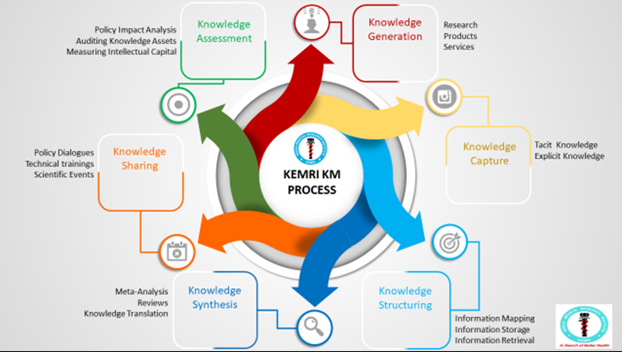RESOURCE DEVELOPMENT AND KNOWLEDGE MANAGEMENT
About Us
Resource Development & Knowledge Management (RD & KM) department falls under the Directorate of Research and Development in KEMRI. The department has three divisions and one unit.
These are:
- Knowledge Centers and Dissemination Division (KCDD).
- Innovation Technology Transfer Division (ITTD).
- Library and Publications Division.
- Intellectual Property Right (IPR) Unit.
RD & KM department is responsible for strengthening institutional capacity in knowledge generation, translation, storage, dissemination and utilization to improve Evidence Informed Decision Making (EIDM) in human health practice, policy and programs.
Mission
To improve human health and quality of life through research, capacity building, innovation and service delivery.
Vision
To be a leading center of excellence in research for human health.
Objectives
- To strengthen Institutional research systems and process by developing knowledge management policy document, developing KEMRI research repository and databases.
- To build, strengthen and sustain a human and physical capacity to conduct, absorb and utilize health research outcome.
- To strengthen knowledge management through translation and communication of research data to inform health policy, strategies and practices.
- To strengthen product development and service delivery by embracing new technologies for product development.
- To strengthen Innovation and Technology Transfer Division to increase the quality of commercial products at least 95%.
- To identify, protect and ensure utilization of the Institutes intellectual assets towards commercialization of the institute research product and services through Intellectual Property Rights Unit.
KM Process Flow

KNOWLEDGE CENTERS AND DISSEMINATION DIVISION (KCDD)
KCDD is responsible for establishing mechanisms for generating, capturing, synthesizing, assessing, sharing, disseminating, accessing and utilizing knowledge to solve health challenges and support the development aspiration of the Nation.
INNOVATION AND TECHNOLOGY TRANSFER DIVISION (ITTD)
One of the Innovation and Technology Transfer Division mandate to produce reliable, sustainable and cost-effective basic health diagnostic reagents/devices.
LIBRARY AND PUBLICATIONS
The Library is responsible for providing reading, reference, research materials, online resources and other services to the KEMRI scientific staff, non-scientific staff, partners, postgraduate students of the KEMRI Graduate School program, students and individuals from other relevant institutions and networks for Health research, administration, teaching and learning.
INTELLECTUAL PROPERTY RIGHT UNIT (IPR)
IPR is responsible for Managing and protecting Institutional data, innovations and intellectual property rights for academic and commercial benefit.
Research Publications
African Journal of Health Sciences (AJHS) – Click Here
List of KEMRI Publications by Year
| Year | Download |
|---|---|
| 2021 | View Publications List |
| 2020 | View Publications List |
| 2019 | View Publications List |
| 2018 | View Publications List |
| 2017 | View Publications List |
| 2016 | View Publications List |
| 2015 | View Publications List |
| 2014 | View Publications List |
| 2013 | View Publications List |
| 2012 | View Publications List |
Policy Briefs
Our Partners

Ms. Lilian Mayieka
Deputy Director KM & RD
Ms. Lilian Mayieka is a Senior Research Scientist at the Resource Development & Knowledge Management department, Kenya Medical Research Institute with over 10 years experience in both quantitative and qualitative research, disease surveillance, outbreak response and health research processes management.
As a Certified Knowledge Manager, Ms. Mayieka has a keen interest in institutional Knowledge management and knowledge synthesis to encourage evidence-based decision making using research findings.
Contact Us
Kenya Medical Research Institute
Resource Development and Knowledge Management
P.O. Box 54840 00200 Off Raila Odinga Way. Nairobi, Kenya.
Email: knowledgemanagement@kemri.go.ke
